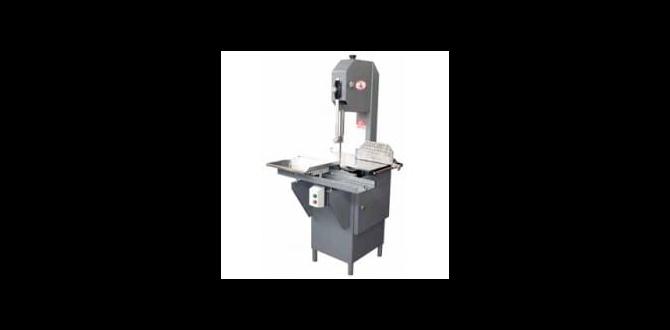For effortless framing projects, look to top brands like Senco, Paslode, and DeWalt for reliable coil framing nailers. These models offer power, durability, and user-friendly features, making them excellent choices for both DIYers and pros tackling construction or renovation tasks with ease.
Ever looked at a framing project and felt a pang of dread about all the hammering? Driving nails one by one can be slow, tiring, and even lead to sore wrists. But what if there was a way to make framing faster, easier, and more accurate? That’s where a coil framing nailer comes in! These powerful tools can dramatically speed up your work, whether you’re building a deck, framing a wall, or working on any large construction project. It’s like giving yourself a superpower for building.
Choosing the right one can seem a bit daunting at first with so many options out there. But don’t worry! I’m Jack Shaffer, your go-to guy for all things nailers here at Nailerguy. I’ve spent years working with these tools and helping folks just like you find the perfect fit for their projects. We’re going to break down what makes a coil framing nailer great and explore some of the best brands that consistently deliver performance and reliability. Get ready to make your projects feel a whole lot easier!
Table of Contents
What Exactly Is a Coil Framing Nailer?
Think of a coil framing nailer as your high-speed nail-driving companion. Instead of holding individual nails, it uses a coil of nails, usually holding anywhere from 100 to over 300 nails at a time. This means you can fire off nail after nail without constantly stopping to reload. They’re specifically designed for heavier-duty tasks where strength and speed are key, like constructing the skeletal frame of a house, building decks, fences, or even assembling large wooden crates.
These nailers typically drive larger nails, known as framing nails, which are essential for securely joining thick pieces of lumber. Because they’re designed for serious work, they pack a punch, ensuring each nail is driven deep and holds firm. It’s the kind of tool that takes the grunt work out of the most demanding parts of a building project.
How They Work
Coil framing nailers operate on pneumatic power, meaning they use compressed air to drive the nails. You’ll need an air compressor to power them. Here’s the basic idea:
- Air Supply: Compressed air is stored in the compressor’s tank.
- Trigger Pull: When you pull the trigger, a valve opens, releasing a burst of compressed air.
- Piston Movement: This air surge pushes a piston down a cylinder at high speed.
- Nail Driving: The piston strikes the nail head, driving it through the wood.
- Return Mechanism: Springs or air pressure quickly return the piston to its starting position, ready for the next shot.
Most modern framing nailers offer two firing modes: sequential and contact actuation. Sequential firing means you have to press the nailer’s nose against the wood (actuate it) and then pull the trigger for each nail. This gives you precise control. Contact actuation lets you hold the trigger down and simply bump the nose of the nailer against the wood to drive nails rapidly, perfect for speed when accuracy isn’t as critical.
Why Use One?
The benefits of using a coil framing nailer are pretty significant, especially for larger projects:
- Speed: This is the biggest win. You can drive a nail in a fraction of a second, making quick work of framing.
- Efficiency: Less time spent reloading means more time building.
- Power: They are designed to drive nails into tough lumber with ease.
- Consistency: Nails are driven to a consistent depth, leading to stronger joints and a cleaner look.
- Reduced Fatigue: Dramatically cuts down on the physical strain compared to manual hammering.
Key Features to Look For in a Coil Framing Nailer
When you’re shopping for the “best brand of coil framing nailer,” it’s not just about the brand name. You need to consider a few important features that will make your projects go smoother. Here’s what to keep an eye on:
Power and Nail Size
A good framing nailer needs enough power to drive its nails deep into various types of wood, including hardwoods. Look for nailers that can handle common framing nail sizes, typically ranging from 2 inches to 3-1/2 inches long and with diameters around .113 to .148 inches. The power, often measured in different ways depending on the manufacturer, should be sufficient to set the nail head flush or slightly countersunk in framing lumber without needing multiple shots.
Weight and Ergonomics
You’ll be holding this tool for extended periods, so comfort is crucial. A lighter nailer with a well-balanced design and a comfortable grip will reduce fatigue. Many modern nailers have rubberized grips and an ergonomic shape to fit nicely in your hand.
Depth Adjustment
The ability to easily adjust how deep the nail is driven is a lifesaver. Some nailers have tool-less depth adjustment, which is fantastic. This feature allows you to set the nail depth precisely. For example, you might want nails slightly countersunk for easier finishing, or flush with the surface for a clean look. A simple dial or lever system makes this a breeze.
Firing Modes
As mentioned, most framing nailers offer sequential and contact firing. For framing, dual-action or contact fire is often preferred for speed, while sequential fire is for precision. Ideally, a nailer will have a selectable trigger that lets you switch between these modes easily.
Magazine Capacity
A larger magazine means fewer reloads. While a full coil might hold 100-300 nails, the practical capacity is what matters. Some coils are easier to load than others, and the design of the magazine feed can affect how smoothly nails are fed.
Durability and Construction
You want a tool that will last. Look for robust construction, often featuring magnesium or aluminum housings. This keeps the tool light while maintaining strength. Check reviews for how well the nailer holds up to heavy use and potential drops.
Safety Features
Safety is paramount. Most nailers have safety tips that prevent firing unless they are pressed against a surface. Some also have features like a lockout to prevent dry firing (driving without a nail in place), which saves wear and tear on the tool and prevents accidental damage to your workpiece.
Top Brands for Coil Framing Nailers
When it comes to reliability and performance, a few brands consistently stand out in the world of nail guns. Investing in a quality brand means you’re likely getting a tool that’s built to last and perform exceptionally well on your projects. Here are some of the best:
Senco
Senco is a powerhouse in the nailer industry, known for innovation and durability. They offer a wide range of professional-grade nailers, and their coil framing nailers are no exception. Their tools are often praised for their power, consistent performance, and robust construction. Many Senco models feature advanced technologies for comfort and efficiency.
Pros:
- Exceptional durability and longevity.
- Powerful driving performance, even into hard woods.
- User-friendly features and good ergonomics.
- Strong reputation among professionals.
Cons:
- Can be pricier than some competitors.
- Availability of parts might vary by region.
Paslode
Paslode is another leading name, particularly famous for its cordless framing nailers, but their pneumatic options are also top-tier. They are known for developing innovative solutions that enhance user experience and tool performance. Many users appreciate their balance and comfortable handling, making them a favorite for long days on the job site.
Pros:
- Excellent balance and comfortable grip.
- Powerful and reliable nail driving.
- Good depth control.
- Strong customer support.
Cons:
- Some proprietary nails might be required for certain models.
- Price point can be at the higher end.
DeWalt
DeWalt is a familiar name to many DIYers and professionals alike, synonymous with tough and reliable tools. Their coil framing nailers are designed for hard work, offering a great blend of power, durability, and user-focused features. They often provide excellent value, packing professional performance into a tool that’s accessible to more people.
Pros:
- Robust construction and built to last.
- Good power output for various framing tasks.
- Often feature tool-free depth adjustment and jam clearing.
- Widely available with good dealer support.
Cons:
- Can be slightly heavier than some competitors.
- Specific models might have varying levels of advanced features.
Hitachi (Now HiKOKI)
Hitachi, now operating under the HiKOKI brand for power tools, has a long-standing reputation for producing high-quality pneumatic tools. Their framing nailers are known for their reliability, precision, and durable construction. If you’re looking for a no-nonsense, workhorse tool, HiKOKI (formerly Hitachi) is definitely worth considering.
Pros:
- Very durable and built for demanding jobs.
- Excellent precision and consistent performance.
- Often competitively priced for their quality.
- Good availability of common parts.
Cons:
- Ergonomics might not be as refined as some other brands for some users.
- Newer HiKOKI branding might cause slight confusion with older Hitachi models.
Freeman
Freeman offers a more budget-friendly option without significantly compromising on performance for many DIY tasks. They are a great choice for homeowners looking to get into pneumatic nailing for occasional projects. While they might not have all the bells and whistles of the top-tier brands, they provide solid performance for the price.
Pros:
- Very accessible price point, great for DIYers on a budget.
- Capable of handling common framing tasks.
- Often come with useful accessories in the package.
Cons:
- Durability might be less than professional-grade brands for very heavy use.
- May lack some of the advanced features found on more expensive models.
How to Choose the Right Coil Framing Nailer for You
Now that you know some of the top brands, let’s talk about making the final decision. It’s all about matching the tool to your needs and how you plan to use it. Here’s a step-by-step approach:
Step 1: Assess Your Projects
Think about the types of projects you’ll be doing. Are you building a small shed, framing a deck, renovating a house, or just doing occasional repairs? If you’re a serious DIYer or a professional, you’ll want a robust, high-performance tool. If it’s for occasional use, a more budget-friendly option might suffice.
Step 2: Consider Pneumatic vs. Cordless
Most coil framing nailers are pneumatic, meaning they require an air compressor and hose. Cordless framing nailers (often using batteries or fuel cells) offer more portability but can be more expensive and sometimes heavier. For pure framing power and consistency, pneumatic is often the go-to, but if mobility is key, consider a cordless model. This guide focuses on pneumatic here, as they are the most common for this type of nailer.
Step 3: Set Your Budget
Coil framing nailers can range from under $100 to well over $300. The higher-end models from brands like Senco and Paslode offer superior durability, performance, and features that justify the cost for professionals or serious hobbyists. Brands like DeWalt and HiKOKI often hit a sweet spot for quality and price. Freeman is great for those on a tighter budget.
Step 4: Read Reviews and Compare Models
Once you’ve narrowed down your brands and budget, dive into specific model reviews. Look for common themes regarding reliability, ease of use, and any recurring issues. Pay attention to reviews from users who do similar work to you.
Step 5: Try to Handle the Tool (If Possible)
If you can visit a local tool store, try holding different nailers. Feel their weight, balance, and how the grip feels in your hand. This hands-on experience can tell you a lot about long-term comfort.
Essential Accessories for Your Coil Framing Nailer
Once you’ve got your nailer, you’ll need a few other things to get started safely and effectively. These aren’t just extras; they’re crucial for a good experience.
Air Compressor
This is non-negotiable for pneumatic nailers. For framing nailers, you’ll need a compressor that can deliver enough airflow (CFM – Cubic Feet per Minute) and pressure (PSI – Pounds per Square Inch) to keep up with nail firing. A good rule of thumb is to get a compressor with a tank of at least 6 gallons and a CFM rating that exceeds your nailer’s needs at 90 PSI. Check your nailer’s manual for specific requirements.
Air Hose
A good quality air hose is important for consistent performance. Look for rubber or heavy-duty PVC hoses. The length is also a factor; too short and you’re tethered, too long and you risk air pressure drop. A 25-foot or 50-foot hose is usually a good starting point. Ensure it has proper fittings that match your compressor and nailer.
Air Fittings and Couplers
You’ll need fittings to connect the hose to the compressor and the nailer. Industrial-style push-to-connect couplers are very common and provide a secure connection. Ensure they are the correct size (e.g., 1/4-inch NPT).
Safety Glasses
Absolutely essential! Always wear safety glasses that meet ANSI Z87.1 standards when operating any power tool, especially a nailer operating at high pressure. Flying debris or nail fragments can cause serious eye injury. For more information on workplace safety standards, you can refer to the Occupational Safety and Health Administration (OSHA) PPE standards.
Hearing Protection
Nail guns can be loud. Wearing earplugs or earmuffs will protect your hearing over the long term. This is especially important for prolonged use.
Nails
Specify using the correct type and size of nails for your specific nailer model. Coil framing nailers use nails collated at an angle, typically 15 or 16 degrees. Using the wrong nails can cause jams, damage the tool, or lead to poor fastening. Check your nailer’s manual for the recommended collation angle and nail specifications.
Air Tool Oil
Many pneumatic tools, including framing nailers, require regular lubrication for smooth operation and longevity. Check your tool’s manual to see if it’s oil-lubricated and follow the manufacturer’s recommendations for frequency and type of oil.
<h2 id="getting-started-with-your-coil-framing-nailer-a-quick-


